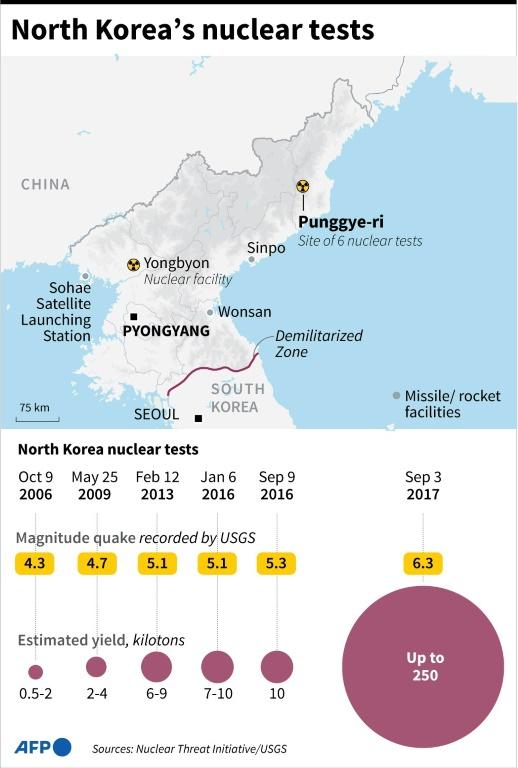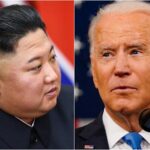
US President Joe Biden and South Korea’s newly sworn-in President Yoon Suk-yeol said Saturday they will consider stepping up joint military exercises in response to the “threat” from North Korea, while also offering to help the isolated dictatorship face down a Covid-19 outbreak.
After meeting in Seoul on Biden’s first trip to Asia as president, the two leaders said in a statement that “considering the evolving threat posed by” North Korea, they “agree to initiate discussions to expand the scope and scale of combined military exercises and training on and around the Korean peninsula.”
Reaching out to Pyongyang, the statement said the two leaders also “express concern over the recent Covid-19 outbreak” there and “are willing to work with the international community to provide assistance” to North Korea to help fight the virus.
Yoon said the offer of Covid aid was being made according to “humanitarian principles, separate from political and military issues” with Pyongyang.
The two presidents are committed to North Korea’s “complete denuclerisation”, he said, adding that “nothing is more important than a strong deterrence against the North”.
Biden began his day by paying respects at Seoul National Cemetery, where soldiers killed defending South Korea, including many who fought alongside US troops in the Korean War, are buried.
He then held closed-door talks with Yoon ahead of a joint press conference and state dinner.
On Sunday, Biden travels to another key US ally, Japan.
A US official said that in addition to tensions over North Korea and the US-led campaign to punish Russia for invading Ukraine, Biden’s main focus Saturday was establishing “a strong personal relationship” with Yoon, who is less than two weeks into his presidency.
Like Japan, South Korea is seen as a key player in US strategy to contain China and maintain what Washington calls the “free and open Indo-Pacific”.
Biden’s Asia trip “is about demonstrating unity and resolve and strengthening the coordination between our closest allies”, the official told reporters on condition of anonymity.
However, the visit is overshadowed by what the US official called “sabre-rattling” across the heavily fortified border in North Korea, which the White House believes might test either a nuclear-capable missile or explosive to take advantage of the high-profile moment.
– Cutting-edge investments –
On arrival Friday, Biden accompanied Yoon on a tour of a massive Samsung semiconductor factory. Relations between the two leaders “got off to a very good start,” the US official said, speaking on condition of anonymity.
Biden called the US-South Korean alliance “a linchpin of peace, stability and prosperity” and highlighted the Samsung plant’s role in maintaining the fragile global supply chain for semiconductors.
The chips are a vital component in almost every piece of sophisticated modern technology, and South Korea and the United States need to work to “keep our supply chains resilient, reliable and secure”, Biden said.
For the US leader, whose Democratic Party fears a possible trouncing in midterm elections in November, snarled supply chains are an acute domestic political challenge, with Americans increasingly frustrated over rising prices and setbacks in the post-Covid pandemic recovery.
Biden emphasised Samsung’s decision to build a new semiconductor plant in Texas, opening in 2024.
In the southern US state of Georgia, the governor on Friday announced that South Korean auto giant Hyundai will build a $5.5 billion plant to produce electric vehicles and batteries — another big priority in Biden’s vision for putting cutting-edge technology at the heart of US industrial strategy.
– US leadership –
Adding to the uncertainty about what is happening in North Korea, the country has admitted it is going through a major outbreak of Covid-19.
On Saturday, North Korean state media reported nearly 2.5 million people had been sick with “fever” with 66 deaths as the country “intensified” its anti-epidemic campaign.
How that crisis might impact Kim Jong Un’s decision on nuclear tests is one of the many unknowns that US and South Korean officials are weighing.
Former CIA analyst Soo Kim told AFP that North Korea’s next step will help steer the US-South Korean relationship under Yoon.
“Should Kim proceed with a test during Biden’s visit, he will effectively be helping the two countries find greater justification to work together on the North Korea issue,” she said.
In Japan, Biden will meet with Prime Minister Fumio Kishida and the emperor.
On Monday, he will unveil a major new US initiative for regional trade, the Indo-Pacific Economic Framework for Prosperity. A day later, he will join a regional summit of the Quad — a grouping of Australia, India, Japan and the United States.
sms/ceb/cwl




